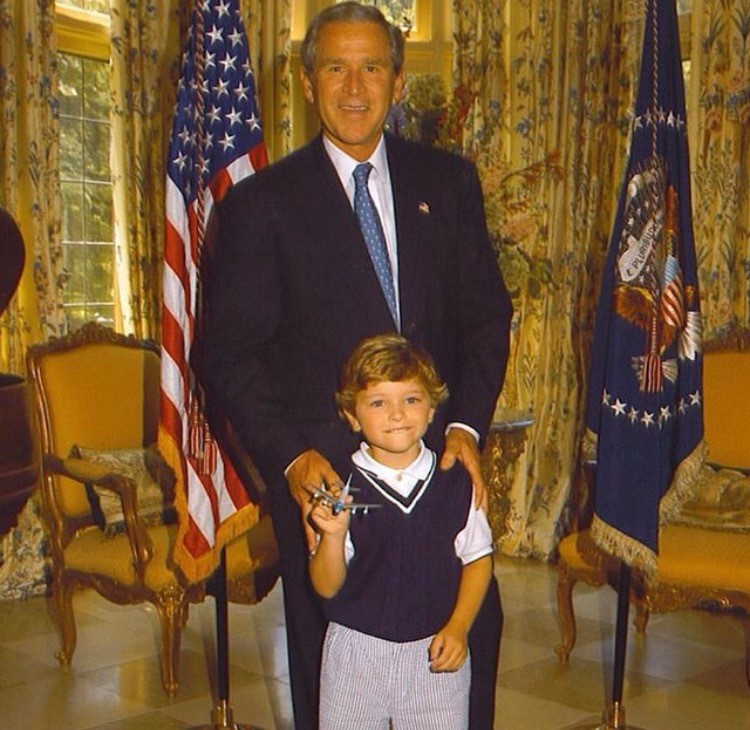Chris Weaver, a Bush Institute Military Service Initiative summer 2019 intern, shares how his experiences this summer will shape his career in the Army.
As a young six-year-old, I had an opportunity to meet President George W. Bush. That day, I carried a toy Air Force One that I asked the president to sign. Without missing a beat, he knelt down, signed his name, and took a photo with me.
As I grew older, I began studying the events of September 11th, 2001 and was particularly drawn to the World Trade Center Cross, a replica of which I wear around my neck, and President Bush’s iconic bullhorn speech. Though I was only three years old at the time of the attacks, I have grown up in a world defined by that day.

Through a combination of President Bush’s actions following 9/11 and a personal desire to be the best possible servant leader to the nation, I applied and was accepted to the United States Military Academy. Fate would have it, 2021 will be the 20th anniversary of 9/11 and the year I graduate.
This summer, I was an intern for the George W. Bush Institute’s Military Service Initiative in Dallas. I was inspired by my work with Team 43 warriors and their stories of bravery in combat and recovery from the invisible and visible wounds of war.
I learned a lot about veterans’ health and well-being during the Bush Institute’s Veteran Leadership Program. I had the opportunity to listen in on a few panels, and noted some takeaways:
- You’re more in your head than you think. Leaders will often over-analyze how their actions might be perceived by both their superiors and subordinates; when in reality neither group is all that affected by how the message is delivered. If the leader is informed and confident in the decision, it will be executed to standard.
- Asking for help is not a sign of weakness. A large part of why many veterans face lasting mental health issues is the stigma associated with seeking help. It is believed therapy will either impact one’s career in the military and/or be seen as a sign of weakness. The main purpose of both this panel and the work being done by the Bush Institute is to remove the stigma and increase the number of veterans receiving treatment.
- Leaders are often too interested in being right instead of doing right. Officers typically follow the notion of “mission first,” but occasionally forget the second part of “soldiers always.” While it is crucial to achieve the goals given by your superiors, your ability to do so is directly linked to how well you take care of your subordinates.
- We need to change the veteran narrative in this country. Far too often, the only stories the average American hears about veterans are those of struggle from either chronic homelessness and/or paralyzing mental/physical injuries. While both are issues plaguing the community, they only affect a very small percentage of the nearly 20 million nationwide. To help change this narrative, for example, Ashley and Andy Williams of “Flip or Flop Fort Worth” on HGTV shared their stories of finding their passion following the military. On the show, they subcontract veterans as much as possible to show the resiliency and capabilities of America’s retired warriors.
The notion of finding your passion really stuck with me because even in my short time in the military, everyone I’ve met has their own big plans for what they want to do after transitioning out of active duty. Whether it be it opening a Bass Pro Shop, farming the crops used for beer, or even working on Wall Street, the work being done by people like Ashley and Andy will pave the way for others to achieve their dreams.
This summer, I also had the opportunity to learn more about the U.S. Department of Veterans Affairs (VA) and how communities can tackle the issue of veteran suicide together with the VA. The Bush Institute’s April and Jay Graham Fellow Col. Miguel Howe testified before the Senate Veterans Affairs Committee and provided recommendations on public-private partnerships. One of the proposed solutions discussed at the hearing will be modeled off the VA’s Supportive Services for Veteran Families (SSVF) program. This program provides VA Grants to non-profit organizations in communities with high populations of homeless veterans to quickly place the warrior in permanent housing and to reintegrate them into society. The hearing alongside the work being done by others across the country, gave me hope that these statistics will significantly improve by the time my future soldiers transition out of the military.
While a busy summer, my most unique task occurred on Prairie Chapel Ranch in Crawford, where President and Mrs. Bush host the W100K bike ride. I was half-joking when I mentioned to the Military Service Initiative team, “If President Bush needs any help on his ranch, I know my way around a tractor and a chainsaw.”
Before I knew it, I was in Crawford building and maintaining mountain bike trails used by President Bush and Team 43 warriors. We spent hours in the triple digit Texas heat cutting trees, removing rocks, and leveling dirt to build an extensive network of professional mountain bike trails. This aspect of the internship provided me with gratifying hard work, a way to give back to President Bush, a new skill in mountain biking, and exposed me to a whole new region of the country.
This internship was truly a broadening experience. I consider this summer to be an absolute success because I aided our nation’s veterans. What began as a much-needed break from the rigors of West Point and a way to further my academic exploration, resulted in an experience that will allow me to become a better officer in the United States Army, and I had the best summer of my life.































